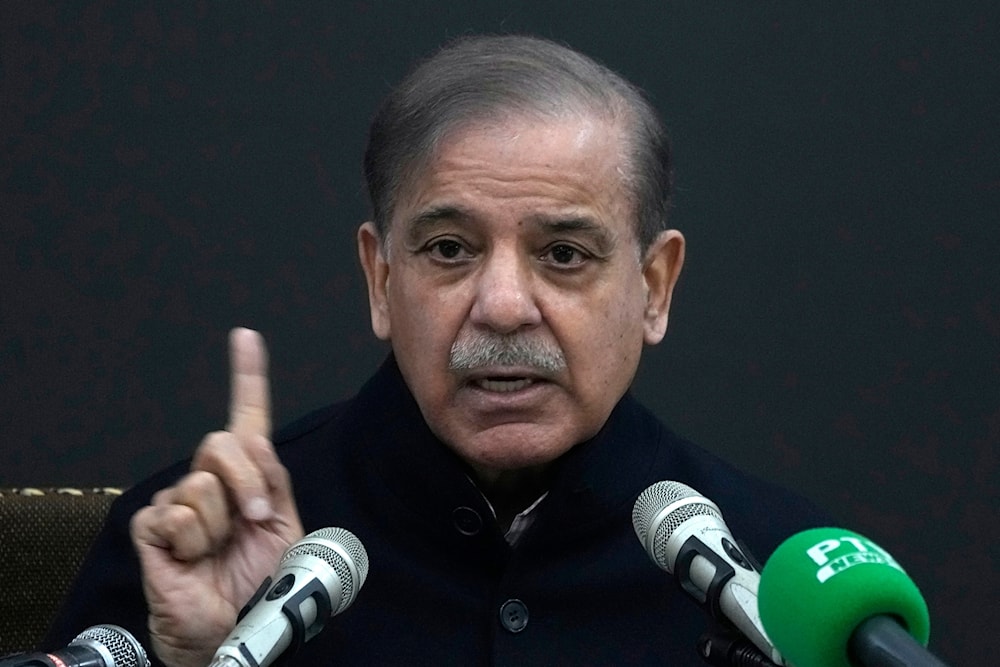Shehbaz Sharif elected as Pakistan PM for second term
Former PM Shehbaz Sharif was elected by the House of Representatives as Prime Minister for another term after the office was held by a caretaker PM.
-

Pakistan's former Prime Minister Shehbaz Sharif speaks during a press conference regarding parliamentary elections, in Lahore, Pakistan, February 13, 2024. (AP)
Shehbaz Sharif, the president of the Pakistan Muslim League-Nawaz (PML-N) party, has been elected as Pakistan's Prime Minister for the second time after a months-long hiatus, Lower House speaker Ayaz Sadiq said on Sunday following a parliamentary vote.
The session saw Shehbaz Sharif securing the premiership with a 201 to 92 vote victory. In contrast, Omar Ayub, the secretary general of the Pakistan Tehreek-e-Insaf (PTI) party, obtained 92 votes, falling short of a win.
Ayaz Sadiq, the lower house speaker, conveyed the election results, stating, "Mian Muhammad Shehbaz Sharif has been elected prime minister with 201 votes. Omar Ayub obtained 92 votes." The announcement was widely covered by Pakistani broadcaster Geo.
Following the official declaration of his victory, Speaker Sadiq invited Shehbaz Sharif to take his place in the prime minister's chair and address Parliament. This marks Shehbaz Sharif's return to the highest executive office in the country after the seat was filled by caretaker prime minister Anwaar-ul-Haq Kakar.
Anti-PTI parties reached agreement on coalition
A coalition comprising the Pakistan Muslim League-Nawaz (PML-N) and the Pakistan People’s Party (PPP) reached an agreement to establish the next government of Pakistan, effectively sidelining the party of former Prime Minister Imran Khan, Tahreek-e-Insaf, despite its victory in the national election.
During a press conference held in Islamabad, it was confirmed that the rival parties, along with two smaller coalition partners, have agreed to form a united government, allegedly to steer Pakistan out of its current challenges. The President of PML-N, Shehbaz Sharif, was announced as their sole nominee for the position of prime minister.
The election of the Prime Minister was preceded by a parliamentary election that many deemed to be fraudulent, rigged, and unfair.
Leading up to the polling day, the Pakistan Tehreek-e-Insaf (PTI) faced a crackdown that limited canvassing and compelled candidates to stand as independents. The party's campaign primarily shifted to the online realm, where social media activities were subjected to censorship through various nationwide blackouts affecting X, as well as platforms like Instagram, TikTok, Facebook, and YouTube.
In the wake of the election, Pakistan witnessed a revelation after senior bureaucrat Liaqat Ali Chattha confessed that he helped rig the country's elections. The commissioner of the city of Rawalpindi, which was won over by the PML-N, announced that he would surrender himself to the police.
Chattha, before resigning from his position, said he supervised the rigging of votes and "converted the losers into winners, reversing margins of 70,000 votes in 13 national assembly seats," he relayed to reporters, adding: "For committing such a heinous crime, I will hand myself over to the police".

 3 Min Read
3 Min Read










